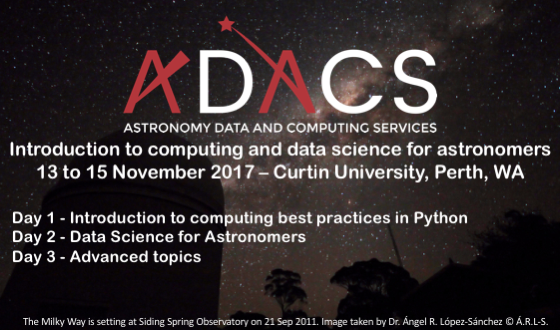
Introduction to computing and data science for astronomers
In the era of big telescopes and big data, data analysis practices need to scale to the volume of data processing and analysis needed for researchers to compete in a world-class arena.
This 3-day workshop is aimed at postgraduate students and ECRs who might not have had formal computational training and would like to get up to speed. Practical examples in the workshop are taken from observational astronomy, however, participation is open to all Australian-based astronomers.
Where: Curtin University, Building 407:Room 307, Bentley Campus, 6102, Bentley. Get directions with Google Maps.
When: 13-15 November 2017, 9am-5pm
Registration is free, please visit Eventbrite to RSVP.
Who: The course is aimed at postgraduate students and ECR who want to learn more about automation and reproducibility of their research. You don’t need to have any previous knowledge of the tools that will be presented at the workshop. However, if you are planning to come to only some of the workshop days you will need to have an understanding of the material taught on the previous day(s).
Requirements: Participants must bring a laptop with a Mac, Linux, or Windows operating system (not a tablet, Chromebook, etc.) that they have administrative privileges on. They should have a few specific software packages installed, further information will be send out the week prior to the workshop.
Accessibility: We are committed to making this workshop accessible to everybody. The workshop organisers have checked that:
- The room is wheelchair / scooter accessible.
- Accessible restrooms are available.
Materials will be provided in advance of the workshop and large-print handouts are available if needed by notifying the organizers in advance. If we can help making learning easier for you (e.g. sign-language interpreters, lactation facilities) please get in touch (using contact details below) and we will attempt to provide them.
Contact: Please email rebecca.lange@curtin.edu.au for more information.
Schedule
Day 1 – Introduction to computing best practices in Python
- Keynote – Astronomer’s toolkit
- Version control (Git)
- Python
- Introduction to Python
- Introducing Jupyter notebooks
- Visualisations
Day 2 – Data Science for Astronomers
- Python
- Pandas
- Astropy tutorials
- Plotting
- Data Acquisition and Virtual Observatories
- Introduction to virtual observatories and how to access data
- e.g., Topcat, Xmatch, SQL and ADQL
- Dealing with fits files
- Integration with Python
- Introduction to virtual observatories and how to access data
Day 3 – Advanced topics
- Introduction to machine learning in Python (scikit-learn)
- Introduction to Nimbus (Pawsey cloud computing)
- Q&A session
- Sundowner (food and drink provided)
